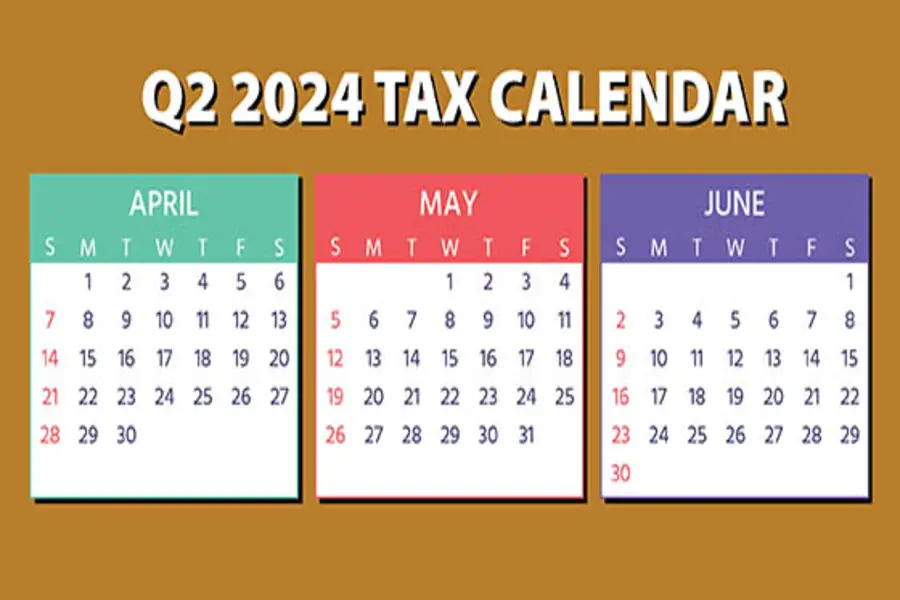As reported in IR-2024-46 Using Inflation Reduction Act funding and as part of ongoing efforts to improve tax compliance in high-income categories, the Internal Revenue Service announced on 2/21/24 plans to begin dozens of audits on business aircraft involving personal use. The audits will be focused on aircraft usage by large corporations, large partnerships and high-income taxpayers and whether for tax purposes the use of jets is being properly allocated between business and personal reasons. The IRS will be using advanced analytics and resources from the Inflation Reduction Act to more closely examine this area, which has not been closely scrutinized during the past decade as agency resources fell sharply. The number of audits related to aircraft usage could increase in the future following initial results and as...

Here are some of the key tax-related deadlines that apply to businesses and other employers during the second quarter of 2024. Keep in mind that this list isn’t all-inclusive, so there may be additional deadlines that apply to you. Contact us to ensure you’re meeting all applicable deadlines and to learn more about the filing requirements. April 15 If you’re a calendar-year corporation, file a 2023 income tax return (Form 1120) or file for an automatic six-month extension (Form 7004) and pay any tax due. For corporations, pay the first installment of 2024 estimated income taxes. Complete and retain Form 1120-W (worksheet) for your records. For individuals, file a 2023 income tax return (Form 1040 or Form 1040-SR) or file for an automatic six-month extension (Form...
If you have a tax-favored retirement account, including a traditional IRA, you’ll become exposed to the federal income tax required minimum distribution (RMD) rules after reaching a certain age. If you inherit a tax-favored retirement account, including a traditional or Roth IRA, you’ll also have to deal with these rules. Specifically, you’ll have to: 1) take annual withdrawals from the accounts and pay the resulting income tax and/or 2) reduce the balance in your inherited Roth IRA sooner than you might like. Let’s take a look at the current rules after some recent tax-law changes. RMD basics The RMD rules require affected individuals to take annual withdrawals from tax-favored accounts. Except for RMDs that meet the definition of tax-free Roth IRA distributions, RMDs will generally trigger a federal income...
Many businesses support their communities by donating to local charities. Although there are plenty of non-profits that deserve your support, some exist solely to facilitate fraud. How can you avoid the latter? Familiarize yourself with the deceptive tactics scammers use and carefully screen charities for legitimacy — before you write a check. Branding tricks Fraud perpetrators employ many tried-and-tested approaches to trick businesses into donating to fake charities. One of the most effective ways that they secure donations is by creating entities that resemble established non-profits. They use familiar-sounding names and familiar-looking logos. They also make their websites and marketing materials appear like those of the charities they’re impersonating. These scammers often use their fake branding in emails and on social media platforms. Not only do they hope...
Your business should generally maximize current year depreciation write-offs for newly acquired assets. Two federal tax breaks can be a big help in achieving this goal: first-year §179 depreciation deductions and first-year bonus depreciation deductions. These two deductions can potentially allow businesses to write off some or all of their qualifying asset expenses in Year 1. However, they’re moving targets due to annual inflation adjustments and tax law changes that phase out bonus depreciation. With that in mind, here’s how to coordinate these write-offs for optimal tax-saving results. §179 deduction basics Most tangible depreciable business assets — including equipment, computer hardware, vehicles (subject to limits), furniture, most software and fixtures — qualify for the first-year Sec. 179 deduction. Depreciable real property generally doesn’t qualify unless it’s qualified improvement property...
Are you dreaming of buying a vacation beach home, lakefront cottage or ski chalet? Or perhaps you’re fortunate enough to already own a vacation home. In either case, you may wonder about the tax implications of renting it out for part of the year. Count the days The tax treatment depends on how many days it’s rented and your level of personal use. Personal use includes vacation use by your relatives (even if you charge them market rate rent) and use by nonrelatives if a market rate rent isn’t charged. If you rent the property out for less than 15 days during the year, it’s not treated as “rental property” at all. In the right circumstances, this can produce significant tax benefits. Any rent you receive isn’t included...
Uncertainty about inflation, regulations and geopolitical risks abounds in today’s marketplace. A fairness opinion can protect against costly litigation if your company engages in a major transaction and the projected results subsequently fall short of expectations or insolvency becomes likely. Here’s how a fairness opinion from an independent business valuator can help protect against post-deal legal claims. The basics Simply put, a fairness opinion addresses whether a transaction appears “fair” from a financial point of view. Fairness opinions help confirm that dealmakers fulfilled their fiduciary duties to act in the best interests of the company and its shareholders. However, fairness opinions don’t address legal or structural fairness, nor do they constitute an endorsement or a guarantee of a particular transaction. When preparing a fairness opinion, the expert typically...
If your small business is strapped for cash (or likes to save money), you may find it beneficial to barter or trade for goods and services. Bartering isn’t new — it’s the oldest form of trade — but the internet has made it easier to engage in with other businesses. However, if your business begins bartering, be aware that the fair market value of goods that you receive in these types of transactions is taxable income. And if you exchange services with another business, the transaction results in taxable income for both parties. Fair market value Here are some examples of an exchange of services: A computer consultant agrees to offer tech support to an advertising agency in exchange for free advertising. An electrical contractor does repair work...
Some people mistakenly believe that Social Security benefits are always free from federal income tax. Unfortunately, that’s often not the case. In fact, depending on how much overall income you have, up to 85% of your benefits could be hit with federal income tax. While the truth about the federal income tax bite on Social Security benefits may be painful, it’s better to understand it. Here are the rules. Calculate provisional income The amount of Social Security benefits that must be reported as taxable income on your tax return depends on your “provisional income.” To arrive at provisional income, start with your adjusted gross income (AGI), which is the number that appears on Page 1, Line 11 of Form 1040. Then, subtract your Social Security benefits to arrive at your adjusted...
The qualified business income (QBI) deduction is available to eligible businesses through 2025. After that, it’s scheduled to disappear. So if you’re eligible, you want to make the most of the deduction while it’s still on the books because it can potentially be a big tax saver. Deduction basics The QBI deduction is written off at the owner level. It can be up to 20% of: QBI earned from a sole proprietorship or single-member LLC that’s treated as a sole proprietorship for tax purposes, plus QBI from a pass-through entity, meaning a partnership, LLC that’s treated as a partnership for tax purposes or S corporation. How is QBI defined? It’s qualified income and gains from an eligible business, reduced by related deductions. QBI is reduced by: 1) deductible...
- 1
- 2
- 3
- 4
- 5
- 6
- 7
- 8
- 9
- 10
- 11
- 12
- 13
- 14
- 15
- 16
- 17
- 18
- 19
- 20
- 21
- 22
- 23
- 24
- 25
- 26
- 27
- 28
- 29
- 30
- 31
- 32
- 33
- 34
- 35
- 36
- 37
- 38
- 39
- 40
- 41
- 42
- 43
- 44
- 45
- 46
- 47
- 48
- 49
- 50
- 51
- 52
- 53
- 54
- 55
- 56
- 57
- 58
- 59
- 60
- 61
- 62
- 63
- 64
- 65
- 66
- 67
- 68
- 69
- 70
- 71
- 72
- 73
- 74
- 75
- 76
- 77
- 78
- 79
- 80
- 81
- 82
- 83
- 84
- 85
- 86
- 87
- 88
- 89
- 90
- 91
- 92
- 93
- 94
- 95
- 96
- 97
- 98
- 99
- 100
- 101
- 102
- 103
- 104
- 105
- 106
- 107
- 108
- 109
- 110
- 111
- 112
- 113
- 114
- 115
- 116
- 117
- 118
- 119
- 120
- 121
- 122
- 123
- 124
- 125
- 126
- 127
- 128
- 129
- 130
- 131
- 132
- 133
- 134
- 135
- 136
- 137
- 138
- 139
- 140
- 141
- 142
- 143
- 144
- 145
- 146
- 147
- 148
- 149
- 150











